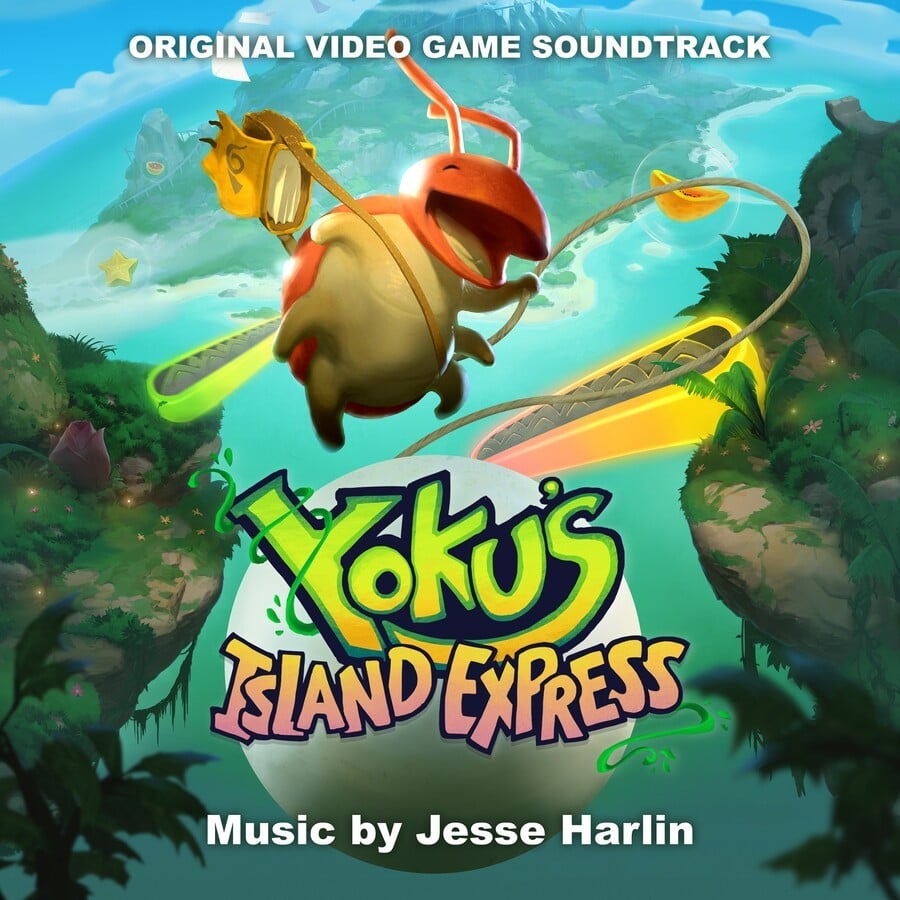
Hearing Yoku's Island Express described paints an interesting picture. It sounds like a weird game. A really weird game. Just listen to reviewer John Cal McCormick desribe the title: " Yoku's Island Express is a 2D, open world, Metroidvania, pinball game starring a dung beetle postman dragged into a battle for the fate of the world on his first day on the job."
It sounds absolutely bonkers, but luckily John liked it quite a bit, calling it a game that "frequently delights". One aspect that frequently delights is in the game's soundtrack. And we got to sit down with the title's composer, Jesse Harlin, about crafting the sound for the title, a long-ago cancelled Lucasarts game, and how to marry an eclectic mixture of sounds to make something wonderful.
Subscribe to Push Square on YouTube167k
Push Square: Hearing a description of this game is truly bizarre. I know my initial reaction was something along the lines of, “Uh, what?!” Is that strangeness something you wanted to cash in when constructing the score for Yoku? And as a part of that, what was your initial reaction to the premise of the game? Did it scream “this is bizarre”? Or did you take it in stride?
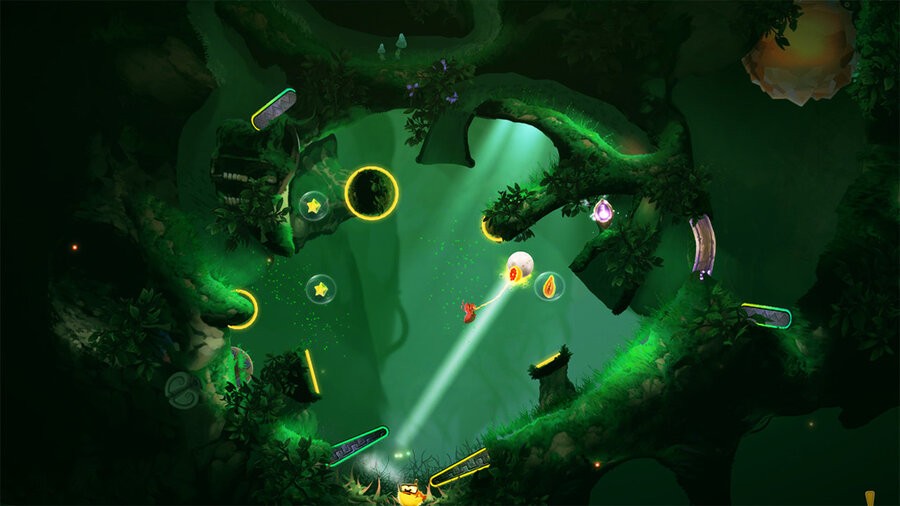
Jesse Harlin: No, my initial reaction was also, “Uh, what?!” I think my reaction was a lot like many other people. I just couldn’t understand how it was all going to work until I actually picked it up and played it for about five minutes. When you do that, it clicks and you realize how simple a concept it actually is. Everyone knows how to play pinball. Everyone loves to explore exotic game locales. You put the two together and you have something magical.
Were there any inspirations that you looked to when crafting the sound? Other games? Movies? Television?
For Yoku, Villa Gorilla wanted me to write like myself, without providing specific references. As inspiration, I decided to go back and listen to those artists that initially got me interested in making music. I listened to old progressive rock albums like Yes, Rush, and Pink Floyd. I listened to 70s electronic music pioneers like Vangelis and Tangerine Dream. I listened to chiptune tracks from the NES era. There was 90s trip-hop and hip-hop. I love the production work on Portishead’s first album Dummy and the Beastie Boys' Hello Nasty. I listened to folk music, the piano scores of old silent movies from the 20s, jazz, and the renaissance works of Josquin des Prez. It was all over the map. And somehow, all of that ended up going into the score.
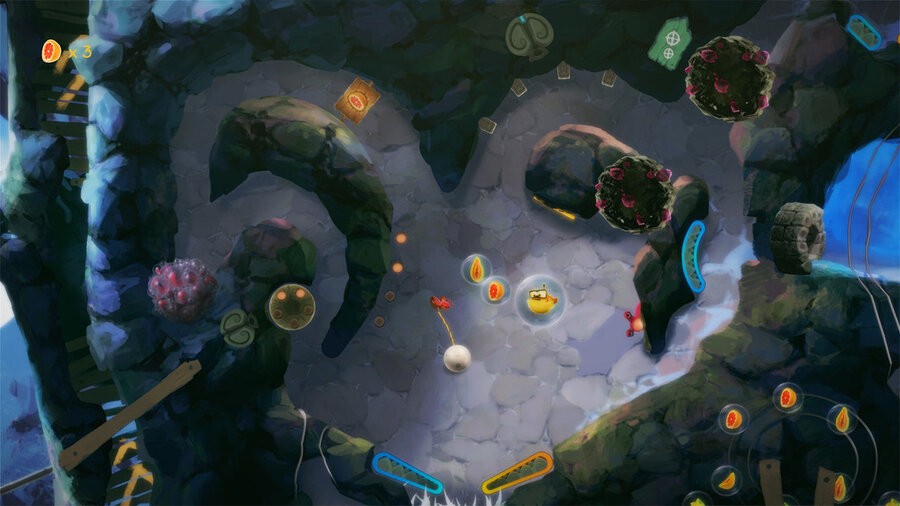
The score for this game evokes the game music of a bygone era, namely PS1/N64 era platformers, and that delightful whimsy that those titles had about them. Walk us through the process of how you developed the sound for the game. Did you have a fully formed idea in your head right out of the gate, or was it more iterative before you got there?
You know, from the first track I wrote to the last track in the game, I don’t think I had a perfectly clear vision of anything until it was all done and in front of me. I had concepts for how I would approach it, but iteration and experimentation were key to this project. Villa Gorilla’s Jens Anderson worked with myself and Tom Bible, Yoku’s audio lead, at LucasArts. While we were all there, we worked on a game called Caveland that died and never saw the light of day, even though it was mostly done. Initially, the music reference point for Yoku was the score I wrote for Caveland. Jens basically gave me a chance to revisit some of those ideas. Not something you get very often in game development.
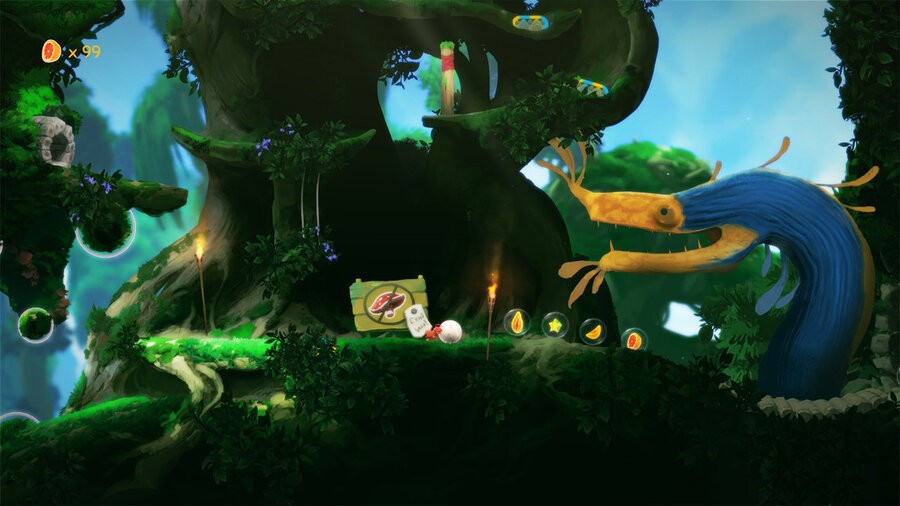
The Caveland score had been one of Brazilian trip-hop, as if Massive Attack had decided to do a samba album. But Yoku was a different game, and while the first couple of pieces that I wrote for the game – the initial beach track and the Gorilla Woods area – have a similar sort of vibe, it goes a long way from there by the time you reach the all out bebop of the end boss battle.
The main goal, though, was simple. The game was about the mixture of two disparate genres of gaming. I was going to make each piece of music a mixture of things that didn’t seem like they’d work together on paper, but ultimately do. Like Tuvan throat singing and chiptune synths. Or a medieval fugue mixed with bebop saxophone.
In what ways did you try and use the instrumentation for the score to help immerse the player? The game plays and feels so tropical, and the music is a massive component of this sense of place.
Because I was trying to mix genres and textures all over the place, the instrumentation for each track is everything. The tropical beach has ukulele and steel drums. The icy peaks have cold sounding instruments like glass marimba and hang drum. But they each also have totally weird elements to them. The tropical beach also has turntablism and beat boxing. The icy peaks have throat singing and the DNA sequence of yeast spoken through a vocoder [a la Daft Punk].
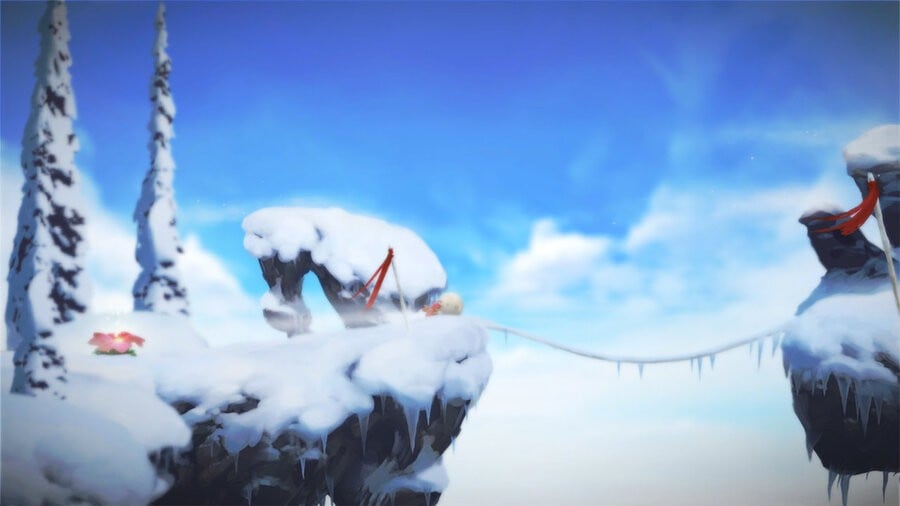
So, the idea was always to create a framework that was sort of what you might expect and then immediately within the same track play off-type from it. Can you mix the industrial steam snare drum effect from something like Nine Inch Nails’ Closer with the piano hijinks of the silent film era’s Keystone Kops? Turns out you actually can. Can you mix a renaissance wind ensemble fugue and sinister sounding reggae in the same cue? Apparently the answer is, “Sure. Why not?”
What’s the origin for incorporating the “disc scratch” elements? On first impression it sounds like such an outlandish element to incorporate with a game such as this despite the fact it integrates quite nicely.
The inspiration was actually the work I’d done on the Caveland score that never was released. I’d been playing around with turntablism on that score and found that I really liked the sound of turntablism run through a kind of synth processor called a ring modulator. So, I wanted to do that again on a score that might actually be heard somewhere. I still love the sound of ring modulators. I run all kinds of things through them just to see what kind of strange sounds they’ll make: bongos, snare drums, didgeridoos, berimbaus.
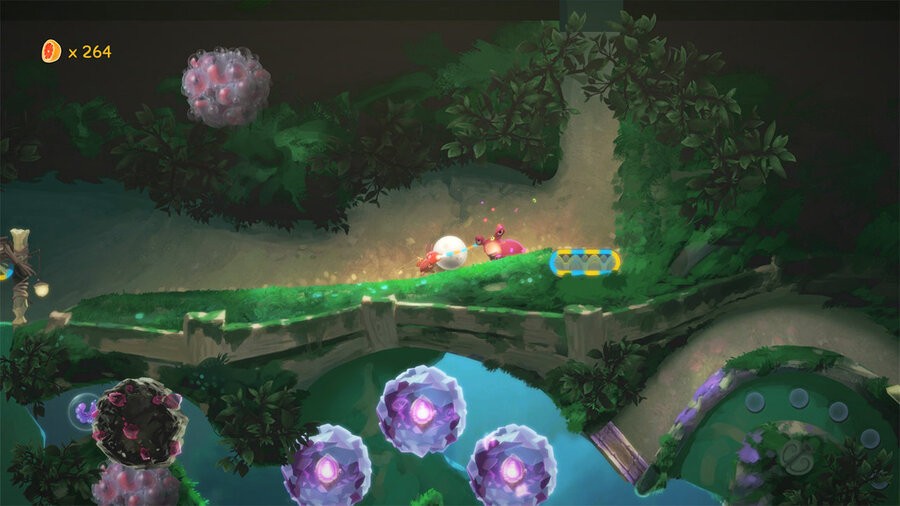
The songs you crafted for this game are downright infectious to listen and are wonderful to just leave on loop to listen all the way through over and over. Is there anything you tried to do to play into that inherent catchiness? Or were you more beholden to the game itself in this regard, and the catchiness just happened to be born from that?
Some people write music as if it’s a muse speaking through them. I’ve never been one of those people. Music for me is a craft, like hewing a sculpture out of a block of marble. I have to work at it, thump on it a little, hammer at it until it takes shape the way I want it to be. And this game was absolutely no different. I worked really, really hard to try and craft every melody into an earworm, a song that burrows its way into your brain and lives there after you’ve walked away from the game. If you’ve played the game and then found yourself humming the main theme while eating dinner later, that’s entirely by design. Also, #sorrynotsorry. I wanted to create a soundtrack that made you want to come back to it and play the game more. I wanted to create something that you could carry around with you when you weren’t playing and it would remind you of the world to which you could return the next chance you got. All by humming catchy melodies.
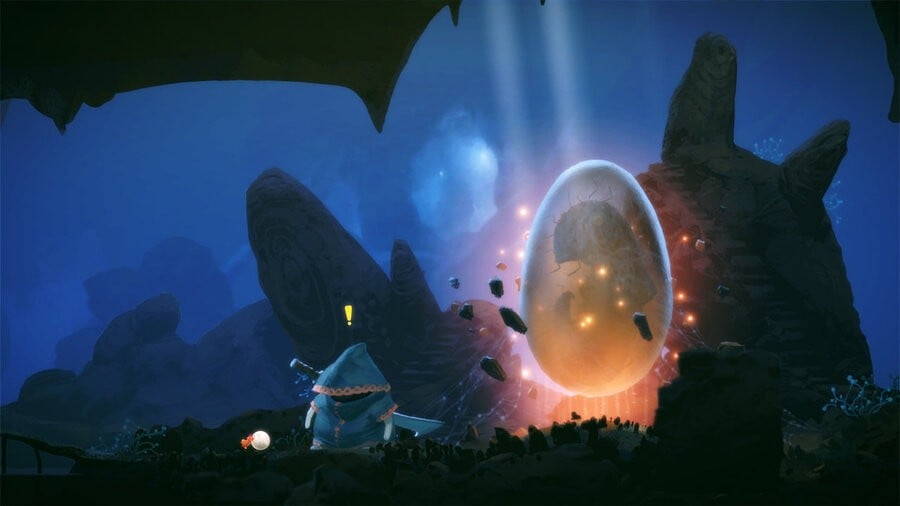
Was there a particular piece or element of the score that you found to not quite be working and did this ultimately impact that overall sound for the game, or was it more of an isolated issue. Maybe a particular level/ area of the title that didn’t feel right?
Muthaeffin’ baritone saxophone. As zany and off-kilter as this game is, I kept thinking that it’d be served really well by the quirky honk of the bari-sax. I don’t know how many cues I tried to fit it in. Six, maybe? It never, ever worked. I kept coming back to it, convinced that bari-sax had a great starring role in this game’s score. But I just couldn’t get it to make any sense and I ended up scrapping it completely.
You’re by no means a stranger to scoring games, having worked on properties as large as the Mafia series and even Star Wars. What particular things that you gleaned from those projects were you able to carry forward to Yoku in any meaningful way.
One of the things John Williams teaches you is the power of melody. Melodies can become characters in a film or game all on their own. So, I knew that Yoku was going to have strong melodies. And the Mafia III score was another one that I really tried to do something unexpected and out of left field. There was a lot of unusual instrumentation on that score: bowed piano, body percussion, 60s production techniques on vintage organ sounds, etc. But it all worked really, really well. So that gave me the confidence to feel like I knew experimentation had value and that I could make cohesive art out of a variety of sources.
Additionally, in what ways, if any, did your time spent working on Yoku differ from those prior projects?
There were a lot of little differences, some of which I almost didn’t know how to react to after 20 years in traditional game development. For instance, the Villa Gorilla guys intentionally didn’t have me sign a Non-Disclosure Agreement. “No, tell people what you’re doing. It’s fine,” they’d say to me. The lack of an NDA also meant that I could partake in the weekly indie scene’s “#screenshotsaturday” share-a-thon that happens on Twitter. I’d talk about things I was doing with my sequencer – MIDI programming stuff, music editing oddities – and share screenshots of the soundtrack in progress, such as this.
And then to close things out, how did you get started in games? Did you come by working in the industry organically? Did you abruptly find yourself in the industry out of the blue? What brought to this strange and wonderful medium?
A 50/50 mix of luck and intense preparation! I’m the definition of the adage "you make your own luck". I was in college 20 years ago and studying film scoring when I realized that: 1) I love games and 2) Someone was writing music for them. So I started asking every teacher, alumni, guest lecturer I could about game music. Back in 1998, no one knew anything about it at a collegiate level. So I didn’t get any answers. What I did get was a reputation as “the guy who wants to score games”.
And then, luckily, one day a call came into the school’s composition department. It was a local development studio and they said, “We’re working on a game for the Sony Playstation and they hate the soundtrack we wrote. Any chance you have someone who wants to write an orchestral score for a video game?” The rest just unfolded from there and I’ve been lucky enough to do it ever since.
And that does it! A fascinating and wildly entertaining interview, offering a peek behind the curtain for the soundtrack to Yoku's Island Express. The soundtrack is available everywhere now, and we highly recommend giving it a look. Give it a listen on Spotify if you don't believe us.





Comments 1
@Kidfried Done! And yes! The soundtrack is so great I love it!
Show Comments
Leave A Comment
Hold on there, you need to login to post a comment...